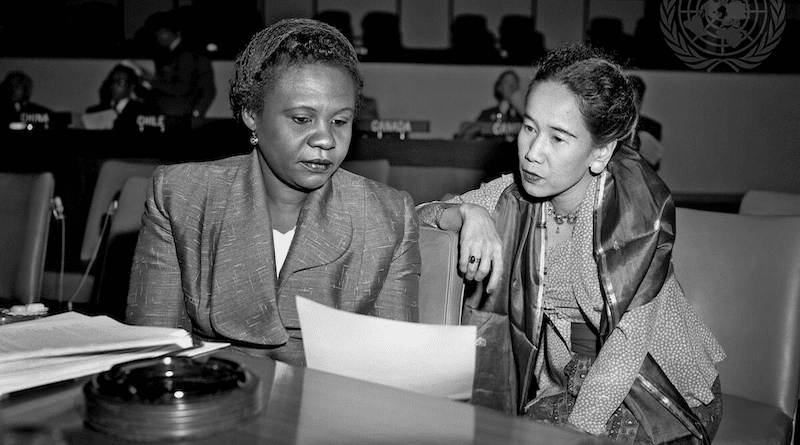Influential Female Diplomat For Indonesia – OpEd
Every March 8th is celebrated as International Women’s Day. This celebration was motivated by an incident in 1908 when around 15,000 women demonstrated in New York, United States of America regarding the apprehensive working conditions where women received low wages. This struggle was then continued by Clara Zetkin by proposing the idea of determining women’s day on an international scale. The idea was then agreed upon by 100 women from 17 countries and established on March 19, 1911, as the celebration of the first international women’s day in Austria, Germany, Switzerland, and Denmark.
Another women’s movement occurred in Russia regarding peaceful action against World War I on March 8, 1913. A year later, this peaceful action was carried out again on the same date. However, when World War II occurred, March 8 was celebrated as an effort to advocate for gender equality. This was later recognized by the United Nations in 1975. This celebration was further strengthened when the former president of the United States, Barack Obama, designated March as women’s history month.
Through this event, women can show that their existence is very influential, reaching an international scale. Gender equality is an issue that is the point of women’s struggle. This equality refers to various aspects of life. Old-fashioned ideas about women, one of which is that women don’t need to pursue higher education, are no longer relevant today. Many women can show special achievements, especially in the field of education, and penetrate other fields such as politics, social affairs, and others.
Women are now starting to spread their wings to various sectors, one of which is politics. The presence of women in politics shows gender equality which is fulfilled based on the principles of good governance. In this article, the author will discuss several Indonesian female diplomats who are very influential in Indonesia and internationally. The first is Laili Roesad. She was the first female diplomat in Indonesia. She began her career at the Ministry of Foreign Affairs in 1949 and often represented Indonesia at United Nations meetings. She was then assigned as ambassador to Belgium (1959-1964) and ambassador to Austria (1967-1970) and even received a service star from the Belgian and Luxemburg governments. During her career, she often attended international conferences, including those on diplomatic law, atomic power in Vienna, and negotiations on the West Irian issue.
Laili Roesad gave her views on women by realizing that there is a ‘man’s world’. This is interpreted as what is done by men can be considered reasonable and acceptable, but if it is done by women, it may react otherwise. Through this reality, she advised women to be good at adjusting themselves and being careful in their actions.
The second Indonesian female diplomat is Supeni Pudjobuntoro. Her career began when she joined the Fujinkai organization, a women’s organization formed by Japan that deals with humanitarian problems in Madiun, East Java. She was then active in helping victims of the revolutionary war through Perwari (Republic of Indonesia Women’s Association).
In 1949, Supeni was appointed by Sukarno as the Council of the Indonesian National Party (PNI). Since then, she has often carried out diplomatic jobs and had the opportunity to serve abroad to learn about general elections in India, as a guide in preparing for the 1955 Indonesian general elections. Supeni was also the first woman to be assigned as an envoy of the Indonesian Government in several Asian and African countries.
Because of her intelligence, Supeni was assigned the task of being the Bureau of Irian by Ali Sastroamidjojo. The Irian Bureau was a body formed in 1954 to revive the actions of the Papuan fighter, Silas Papare, in an attempt to take over Papua into the unitary territory of the Republic of Indonesia. However, support for Indonesia in the issue of Papua from Asian and African countries has not been sufficient for a majority vote at the United Nations assembly. Because of that, Indonesia sent representatives to take a special approach and lobby countries to support Indonesia through the Irian Bureau, including Supeni.
Supeni actively made working visits to other countries even though on June 9, 1956, the Irian Bureau had to be disbanded. Supeni, who served as ambassador, increasingly actively lobbied ahead of the UN session on the Papua issue until 1962. Through this effort, she was nicknamed the Irian lady. Another of Supeni’s achievements, namely where Supeni succeeded in lobbying France not to make Algeria and North Africa apartheid countries. Supeni conducted this lobbying through the intermediary of the Prince of Cambodia, Norodom Sihanouk, to be submitted to the French President, Charles de Gaulle.
Currently, more and more women are working as diplomats, which at the same time breaks the stigma that diplomacy is a man’s job. The existence of women as diplomats also plays an important role where women have characteristics that are nurturing and look into details. Women also have advantages in soft power diplomacy, which uses a dialogue and negotiation approach to solve problems. Female diplomats are also at the forefront of protecting Indonesian migrant workers, the majority of whom are women. In this case, female diplomats help Indonesian migrant women who experience violence, sexual harassment, and so on considering that fellow women will be more open.
We can learn from the two figures above that as women we can make changes according to our capacity. We don’t need to be diplomats to make changes. But we can take part in other professions. In addition, efforts to achieve equality for women need to be further encouraged. Equality here does not mean that women want to be ‘more’ than men. However, women want to get the same rights and opportunities as men. Women and men can complement each other considering that women and men have different basic characteristics.
Grace Inka Putri is currently studying as a final year student majoring in international relations at the Lampung University in Indonesia.

